Faust, Royal Opera review - pure theatre in this solid revival | reviews, news & interviews
Faust, Royal Opera review - pure theatre in this solid revival
Faust, Royal Opera review - pure theatre in this solid revival
A Faust that smuggles its damnation under theatrical spectacle and excess
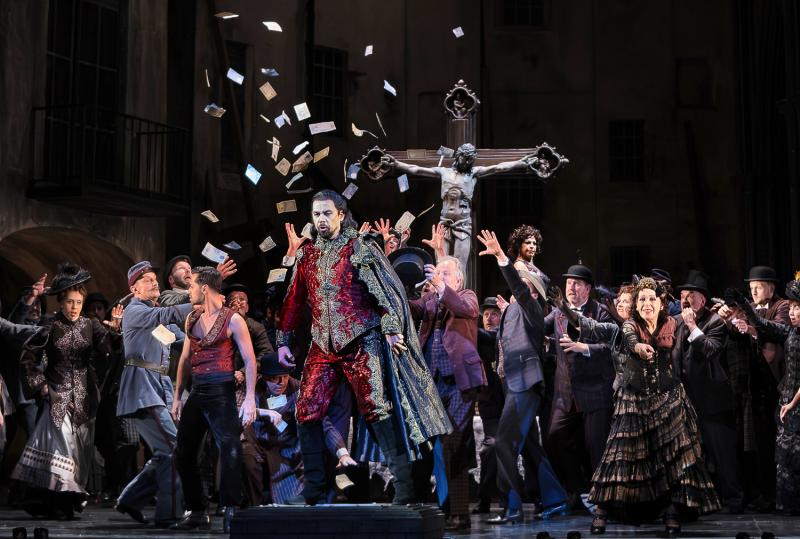
“Satan come to me!” The Devil doesn’t so much appear in David McVicar’s Faust as reveal himself to have always been there. We discover him – travelling trunk and brandy glass to hand, lazy smile on his lips – considering the interior of designer Charles Edwards’ magnificent church in Gounod’s own Second Empire Paris. And why not?
First seen in 2004, McVicar’s staging still has all the illicit sheen and lure of Marguerite’s jewels. In an era of austerity (even at the Royal Opera) this kind of old-school, expensive theatricality – chunky, proscenium-kissing sets, a whole corps of dancers, an army of chorus, children, costumes galore – has a renewed appeal, trading off a protracted running time with plenty to look at.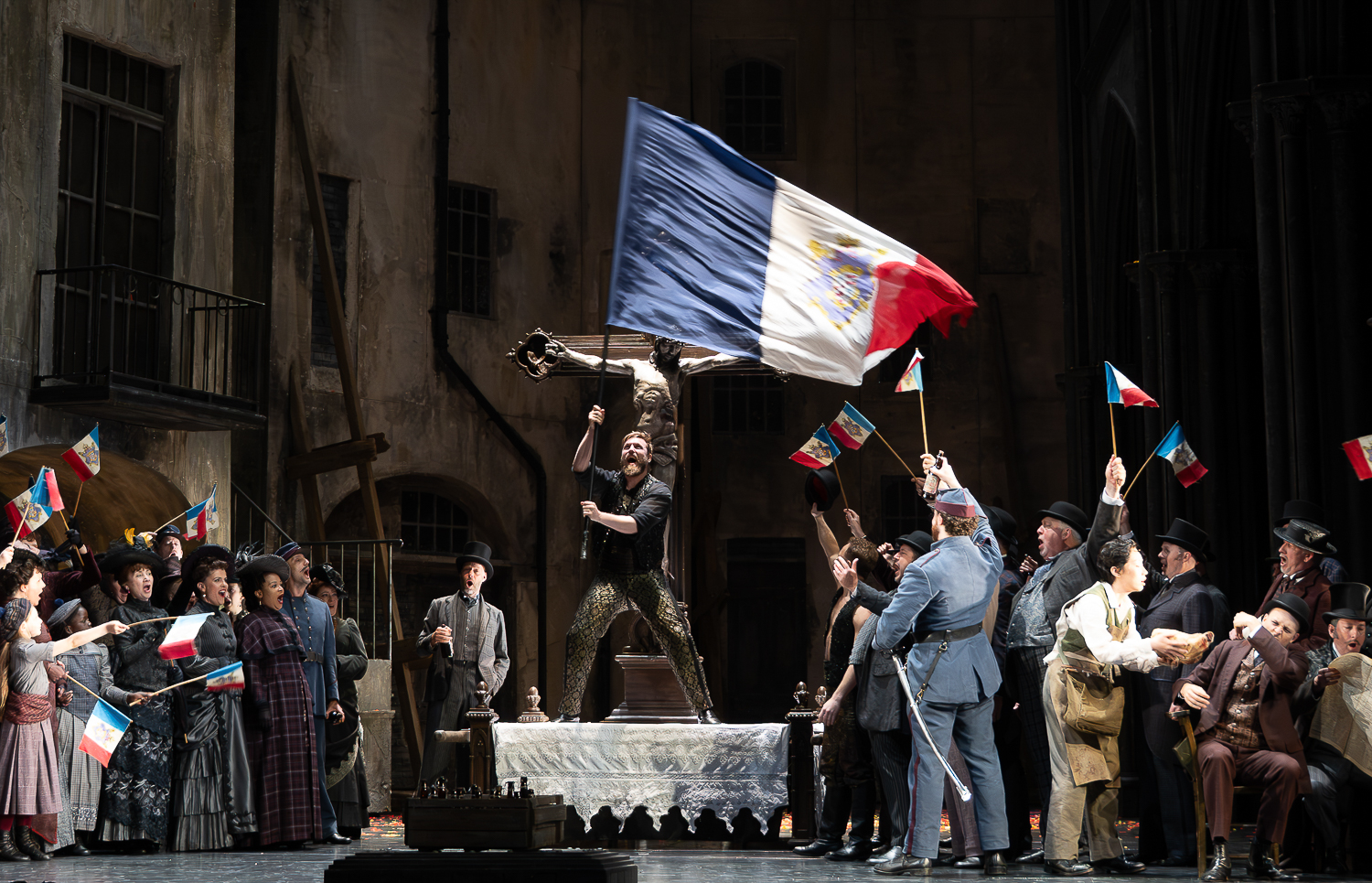 But the ghosts here are legion. Since its premiere this production has seen some vocal heavy-hitters, starting with Terfel, Gheorghiu, Alagna and Keenlyside, and continuing through John Tomlinson, René Pape, Hvorostovsky, Fabiano and Beczala – with only Netrebko (replaced by Sonya Yoncheva) the one that got away. The field is a crowded one for any stars wanting to make their mark.
But the ghosts here are legion. Since its premiere this production has seen some vocal heavy-hitters, starting with Terfel, Gheorghiu, Alagna and Keenlyside, and continuing through John Tomlinson, René Pape, Hvorostovsky, Fabiano and Beczala – with only Netrebko (replaced by Sonya Yoncheva) the one that got away. The field is a crowded one for any stars wanting to make their mark.
With Maurizio Benini back in the pit again, his tempos fairly sedate, but with the impulsion and crispness to propel us through Gounod’s sprawling score, the focus was on the leading quartet and especially Bolivian-Albanian soprano Carolina López Moreno. A last-minute jump-in as Magda in the London Symphony Orchestra’s concert La Rondine with Pappano last December put her on the UK map, and this Royal Opera debut was a chance to see what she could do with a bigger stage.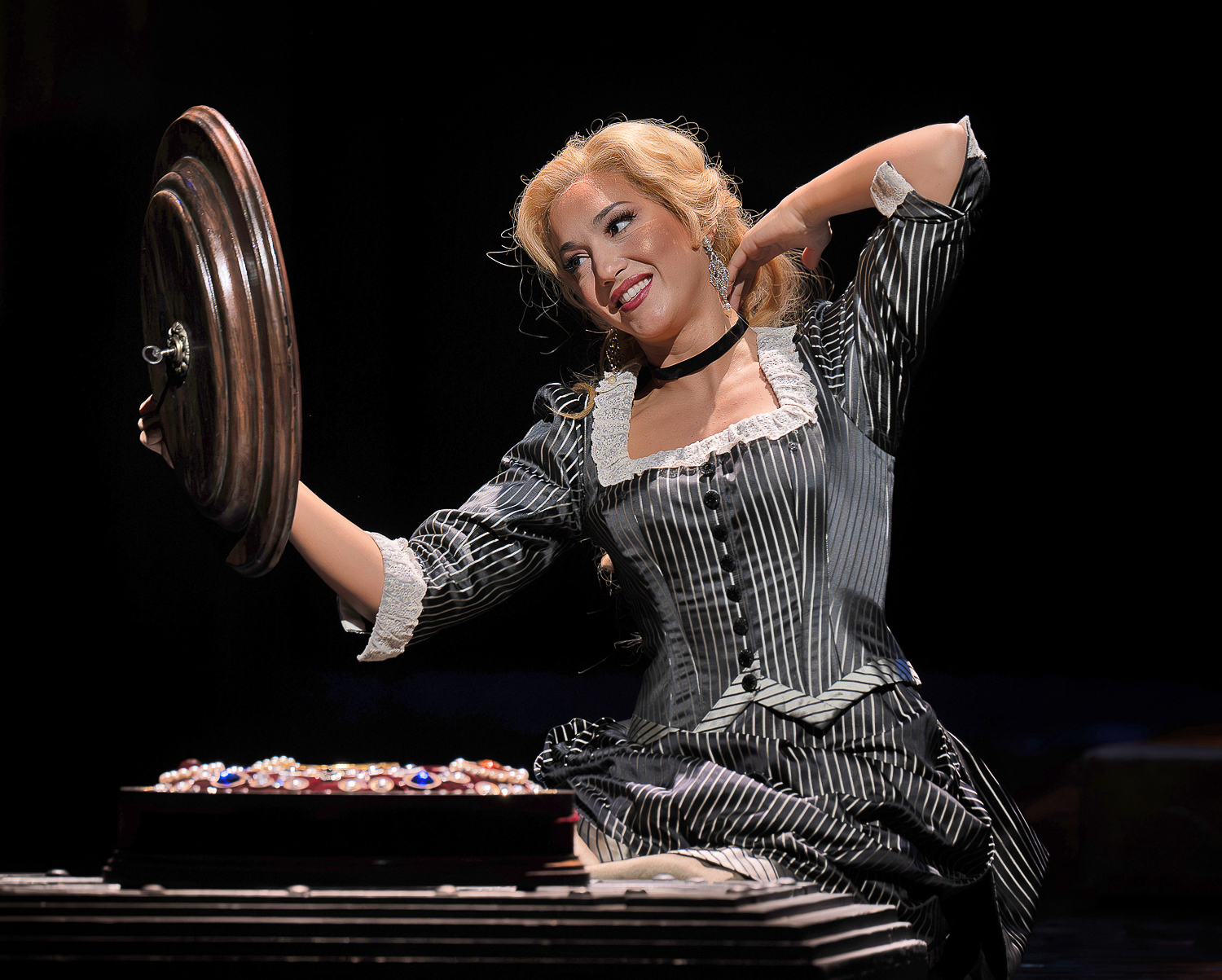 Plenty, it turns out. Moreno (pictured above) is a striking figure on stage, kitted out ready for Manet’s Folies-Bergère as she waits tables in Act II, her smoky-sweet voice gleaming through the Jewel Song (though strangely and consistently sour in the preceding “Il était un roi de Thulé), daringly quiet and fragile in the final mad scene. Holding her own on a crowded stage – more, as yet, through charisma than sheer vocal muscle – she’s got the goods, though not absolutely as yet the control.
Plenty, it turns out. Moreno (pictured above) is a striking figure on stage, kitted out ready for Manet’s Folies-Bergère as she waits tables in Act II, her smoky-sweet voice gleaming through the Jewel Song (though strangely and consistently sour in the preceding “Il était un roi de Thulé), daringly quiet and fragile in the final mad scene. Holding her own on a crowded stage – more, as yet, through charisma than sheer vocal muscle – she’s got the goods, though not absolutely as yet the control.
Spinning their net around her in this revival are Stefan Pop’s Faust and Adam Palka’s Méphistophélès. Palka can act, and this is a show that gives him plenty of chance, exchanging glances with the audience and raising weary eyebrows as the inevitable tragedy plays out. Vocally it’s at its best below the stave, where there’s a deliciously charry, sooty depth. Higher up a woolliness dulls the voice (his “Le veau d’or” fails to project on a busy stage), and his French is almost unintelligible.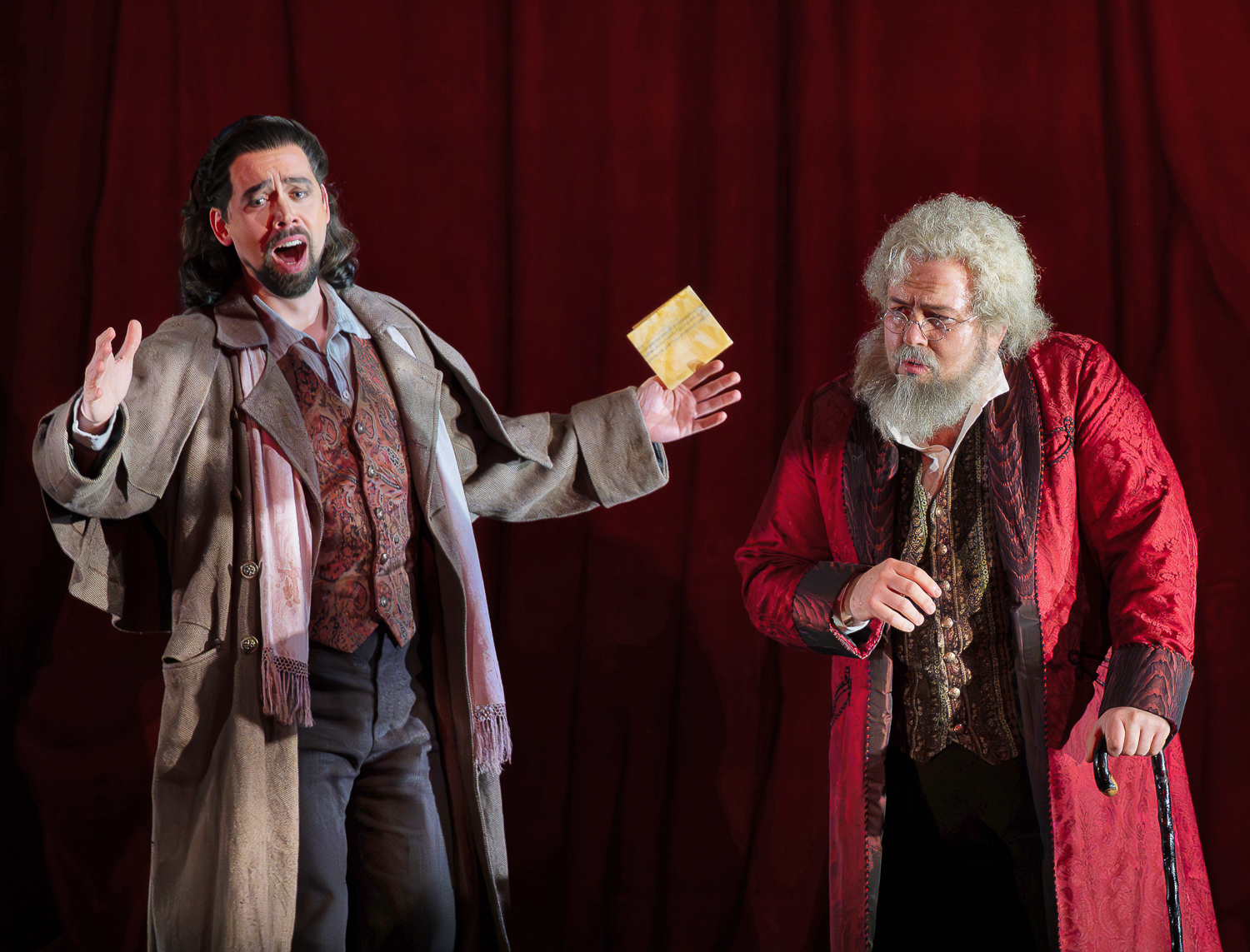 Pop (pictured above with Palka) is a puppet-Faust, blinded by lust and bitterness. Dancing obediently to the Devil’s tunes, he brings little warmth to his courtship. “Laisse-moi” is bright but lacks warmth – hardly an irresistible seduction – though “Salut demeure chaste et pure” rings attractively enough. There’s tension at the top of the voice and he tends to shout through ensembles. The pick of the principals is Boris Pinkhasovich’s Valentin, startling a cool first-night audience into the evening’s first applause with his “Avant de quitter ces lieux” – his burnished tone set off by the chalky pastel of the oboe, one of many fine woodwind solos through the evening.
Pop (pictured above with Palka) is a puppet-Faust, blinded by lust and bitterness. Dancing obediently to the Devil’s tunes, he brings little warmth to his courtship. “Laisse-moi” is bright but lacks warmth – hardly an irresistible seduction – though “Salut demeure chaste et pure” rings attractively enough. There’s tension at the top of the voice and he tends to shout through ensembles. The pick of the principals is Boris Pinkhasovich’s Valentin, startling a cool first-night audience into the evening’s first applause with his “Avant de quitter ces lieux” – his burnished tone set off by the chalky pastel of the oboe, one of many fine woodwind solos through the evening.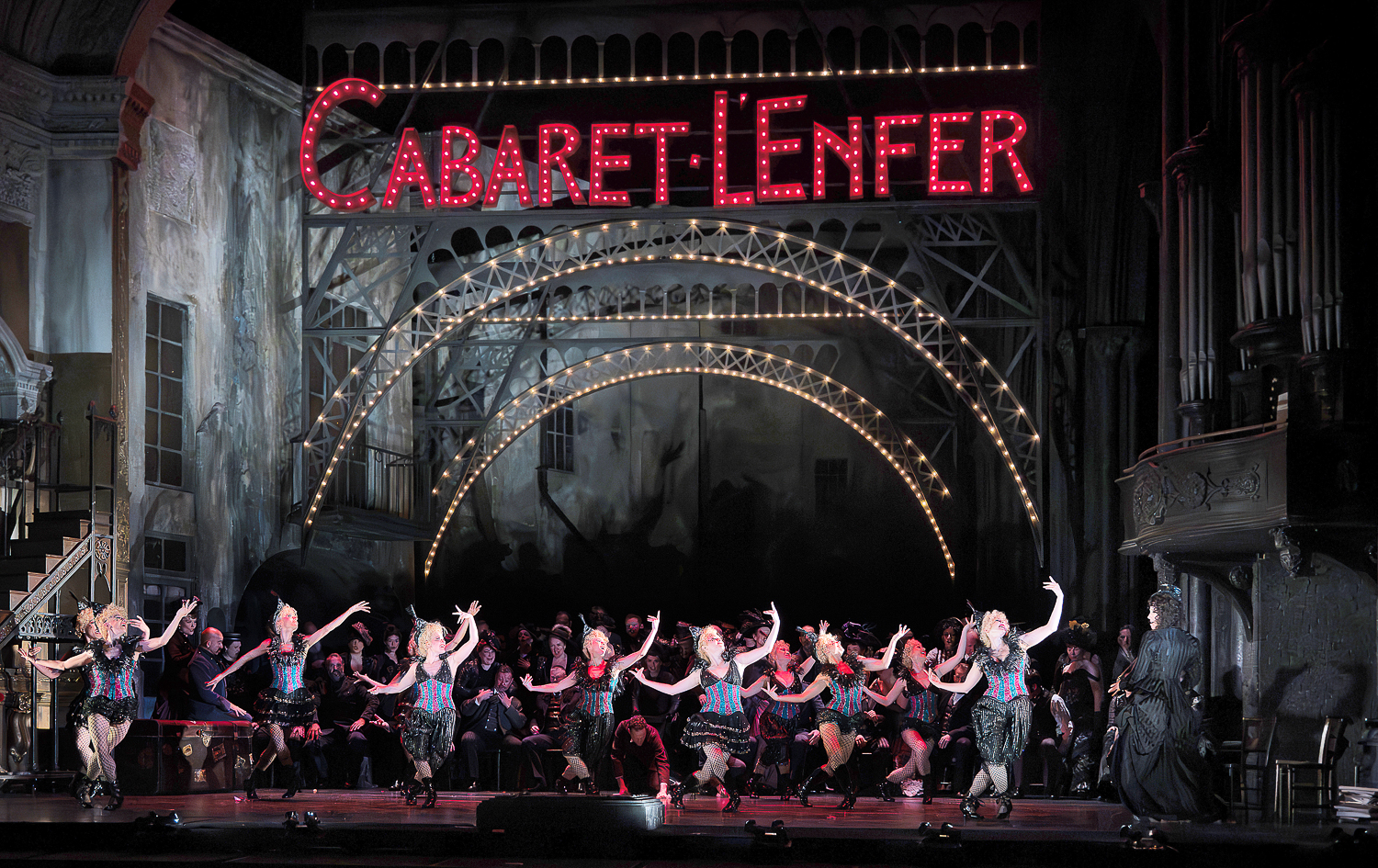 Does the staging really need the Walpurgis Night ballet – a hideous Giselle-turned-orgy that makes its point in the first few minutes and then goes on for substantially longer? The music hardly makes a case for it, and striking though Méphistophélès’s sequinned ballgown for Faust’s drug-induced visions, it has since been eclipsed as a gesture by Stefan Herheim’s disturbing Les Vepres Siciliennes for the same house. The cabaret and street scenes are still winners though, and the male chorus’s “Gloire immortelle” is Grand Opera at its grandest.
Does the staging really need the Walpurgis Night ballet – a hideous Giselle-turned-orgy that makes its point in the first few minutes and then goes on for substantially longer? The music hardly makes a case for it, and striking though Méphistophélès’s sequinned ballgown for Faust’s drug-induced visions, it has since been eclipsed as a gesture by Stefan Herheim’s disturbing Les Vepres Siciliennes for the same house. The cabaret and street scenes are still winners though, and the male chorus’s “Gloire immortelle” is Grand Opera at its grandest.
As a collision of church and theatre this Faust is still a deal worth making: a sly little parable, whose darkest gestures are so effectively bundled up in Second Empire velvet and feathers and chiffon that it’s not until later that you realise their poison.
The future of Arts Journalism
You can stop theartsdesk.com closing!
We urgently need financing to survive. Our fundraising drive has thus far raised £49,000 but we need to reach £100,000 or we will be forced to close. Please contribute here: https://gofund.me/c3f6033d
And if you can forward this information to anyone who might assist, we’d be grateful.

Subscribe to theartsdesk.com
Thank you for continuing to read our work on theartsdesk.com. For unlimited access to every article in its entirety, including our archive of more than 15,000 pieces, we're asking for £5 per month or £40 per year. We feel it's a very good deal, and hope you do too.
To take a subscription now simply click here.
And if you're looking for that extra gift for a friend or family member, why not treat them to a theartsdesk.com gift subscription?
more Opera
 Orpheus and Eurydice, Opera Queensland/SCO, Edinburgh International Festival 2025 review - dazzling, but distracting
Eye-popping acrobatics don’t always assist in Gluck’s quest for operatic truth
Orpheus and Eurydice, Opera Queensland/SCO, Edinburgh International Festival 2025 review - dazzling, but distracting
Eye-popping acrobatics don’t always assist in Gluck’s quest for operatic truth
 MARS, Irish National Opera review - silly space oddity with fun stretches
Cast, orchestra and production give Jennifer Walshe’s bold collage their all
MARS, Irish National Opera review - silly space oddity with fun stretches
Cast, orchestra and production give Jennifer Walshe’s bold collage their all
 Káťa Kabanová, Glyndebourne review - emotional concentration in a salle modulable
Janáček superbly done through or in spite of the symbolism
Káťa Kabanová, Glyndebourne review - emotional concentration in a salle modulable
Janáček superbly done through or in spite of the symbolism
 Buxton International Festival 2025 review - a lavish offering of smaller-scale work
Allison Cook stands out in a fascinating integrated double bill of Bernstein and Poulenc
Buxton International Festival 2025 review - a lavish offering of smaller-scale work
Allison Cook stands out in a fascinating integrated double bill of Bernstein and Poulenc
 Tosca, Clonter Opera review - beauty and integrity in miniature
Happy surprises and a convincing interpretation of Puccini for today
Tosca, Clonter Opera review - beauty and integrity in miniature
Happy surprises and a convincing interpretation of Puccini for today
 Hamlet, Buxton International Festival review - how to re-imagine re-imagined Shakespeare
Music comes first in very 19th century, very Romantic, very French operatic creation
Hamlet, Buxton International Festival review - how to re-imagine re-imagined Shakespeare
Music comes first in very 19th century, very Romantic, very French operatic creation
 Falstaff, Glyndebourne review - knockabout and nostalgia in postwar Windsor
A fat knight to remember, and snappy stagecraft, overcome some tedious waits
Falstaff, Glyndebourne review - knockabout and nostalgia in postwar Windsor
A fat knight to remember, and snappy stagecraft, overcome some tedious waits
 Salome, LSO, Pappano, Barbican review - a partnership in a million
Asmik Grigorian is vocal perfection in league with a great conductor and orchestra
Salome, LSO, Pappano, Barbican review - a partnership in a million
Asmik Grigorian is vocal perfection in league with a great conductor and orchestra
 Semele, Royal Opera review - unholy smoke
Style comes and goes in a justifiably dark treatment of Handelian myth
Semele, Royal Opera review - unholy smoke
Style comes and goes in a justifiably dark treatment of Handelian myth
 Le nozze di Figaro, Glyndebourne review - perceptive humanity in period setting
Mostly glorious cast, sharp ideas, fussy conducting
Le nozze di Figaro, Glyndebourne review - perceptive humanity in period setting
Mostly glorious cast, sharp ideas, fussy conducting
 Fidelio, Garsington Opera review - a battle of sunshine and shadows
Intimacy yields to spectacle as Beethoven's light of freedom triumphs
Fidelio, Garsington Opera review - a battle of sunshine and shadows
Intimacy yields to spectacle as Beethoven's light of freedom triumphs
 Dangerous Matter, RNCM, Manchester review - opera meets science in an 18th century tale
Big doses of history and didaction are injected into 50 minutes of music theatre
Dangerous Matter, RNCM, Manchester review - opera meets science in an 18th century tale
Big doses of history and didaction are injected into 50 minutes of music theatre

Add comment